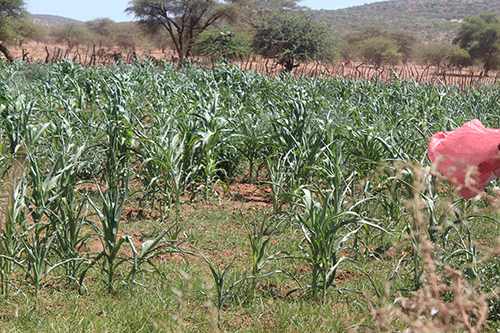OKANGUATI – Following sporadic rainfall in the Kunene region, the regional leadership wants immediate food consignment intervention from the government, as they fear for the lives and livelihoods of inhabitants.
The persistent drought has significantly affected both humans and livestock, with locals now pleading with the government to make provisions for food and fodder to save lives.
The dire situation came to light when politicians joined governor Marius Sheya on a trip with various stakeholders to take government services to the people last week.
The regional councillor for the Sesfontein constituency Hendrik Gaobaeb explained that the region has received a low pattern of rainfall since the beginning of January and the rural farmers are vulnerable as they are affected by the persistent drought in the region for the past seven years.
“Some of the areas where the region received good rainfall in 2023 experienced veld fire, especially in Kunene south, Khorixas, Kamanjab and Outjo. But part of Kunene north such as Sesfontein, Epupa, Opuwo Rural and Urban constituencies did not receive adequate rainfall and the communities are in panic mood as they heard food distribution will end by March 2023,” he told New Era.
The region’s chairperson has written to the Office of the Prime Minister requesting for the government to extend the distribution of the drought relief food programme in the region.
“The situation is beyond the regional leadership’s control on how to sustain the livelihood of regional inhabitants at this moment. The extension requires an immediate response in the form of food consignment to the communities and fodder for livestock,” he said.
He continued that the leaders want the government to extend the drought relief programme in Kunene till 2024 or till the community reaches the drought recovery stage.
The local farmers who attended the meeting in Okanguati said they are anticipating that the drought for this year will be worse compared to the last seven consecutive years the region has been suffering. Although it is not the end of the rainy season yet and rain can still be expected, for many farmers it is too late.
Karungojo Muhenje of the Kakurukaze Traditional Authority, said the drought situation has not improved, since most of the villages received minimal rain this year.
“Most of the boreholes have dried up. The government need to start drilling new boreholes before the situation gets out of hand,” he explained.
Matheus Ruhozu, Chief of Otjiurungu Traditional Authority also concurred with those who took their floor to discuss the drought relief situation.
“We can all see the drought situation in the region. This situation is getting out of control, hence there is a need for the government to start strategising on how they are going to meet us halfway,” he explained.
Jeremia Gaobaeb of the NamiDaman Traditional Authority was also concerned about the drought, saying livestock and people’s lives are at stake this year.
“You can see that the maize in the fields have dried up before they bear any fruits. That is a sign that there will be hunger this year and people will entirely depend on government drought relief food,” he anticipated.



